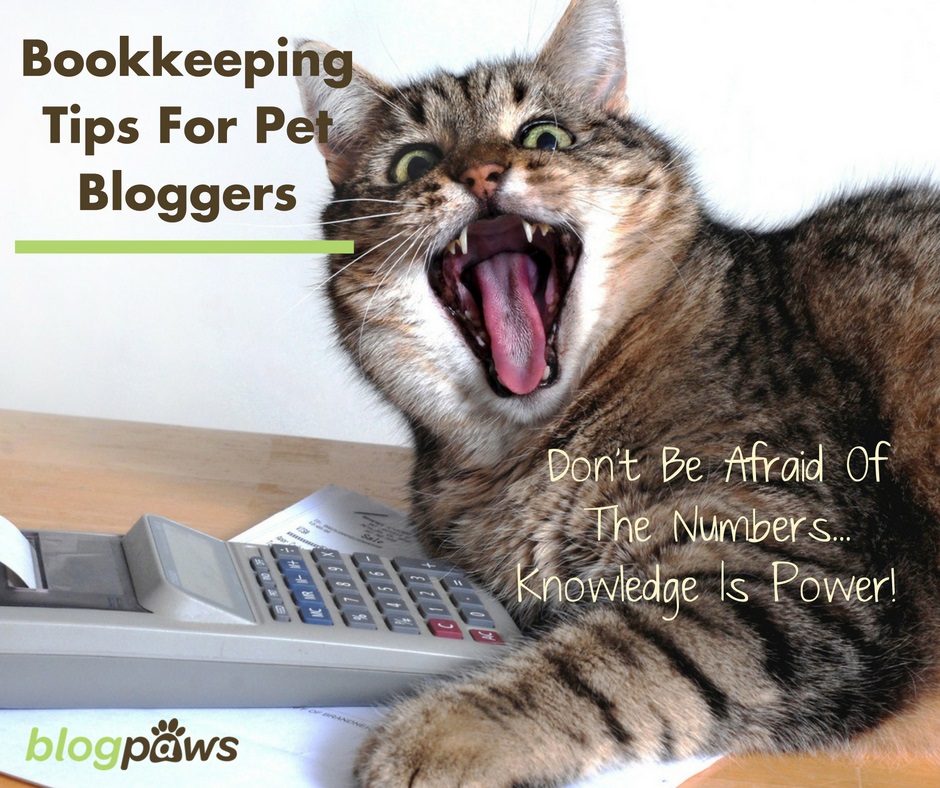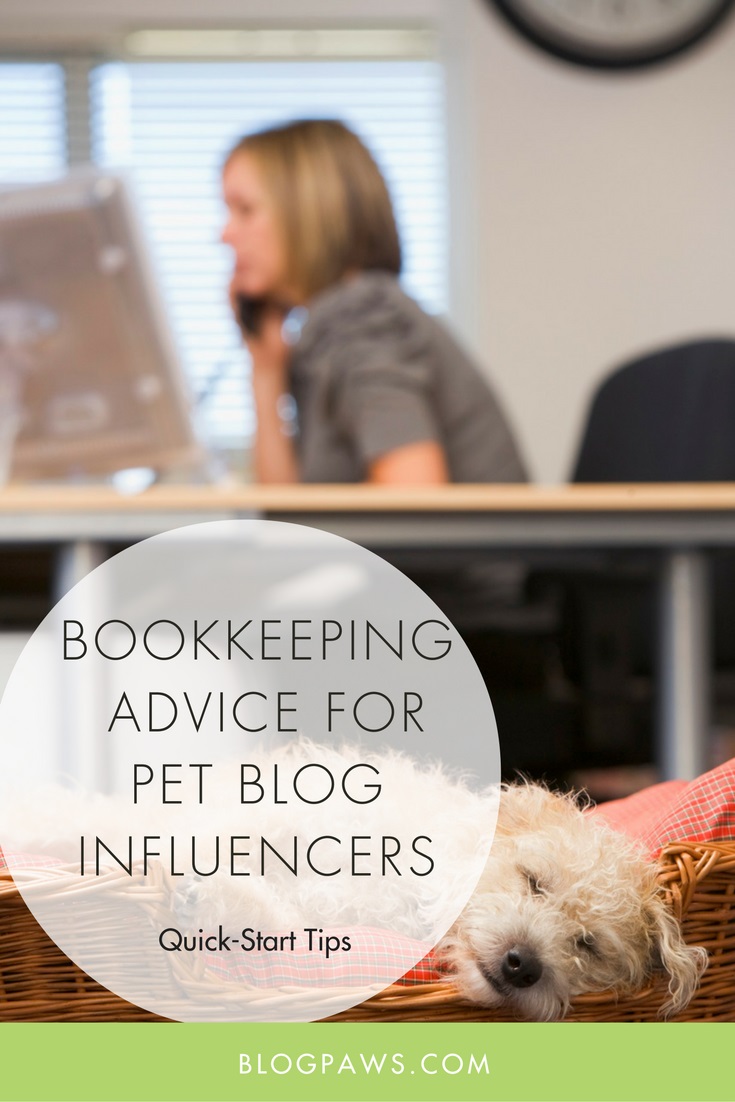Bookkeeping Tips for Bloggers
In this post we will cover the basics of mathematics and bookkeeping tips for pet business owners. Now, don’t run away! Believe me: If a math-phobe such as myself can talk about numbers and the basics of bookkeeping for the pet influencer, then you can calm your math fears and stay with me!
I’ll be the first to admit that my mind doesn’t wrap itself around numbers the way it wraps itself around words. I can make change in my head like nobody’s business, but that was ingrained in me when I worked at a grocery store wayyyyy back in the day when the cash registers weren’t computerized and we had to count the change back to the customer.
Spreadsheets. Quickbooks. Debits. Credits. Balancing a bank statement. Those are words and phrases that make my blood run cold. If you feel the same, I have some bad news if you want to make it as a pet blogger influencer. If you want to be taken seriously as a pet blogger, and as a small business owner, you need to think and act like one.
That means you need to tackle the “math” aspects of it all.
Quick note: These bookkeeping tips for bloggers are just some ideas and suggestions and shouldn’t be considered financial advice. Always consult a professional! 
First, why should you set up a business accounting system?
Here are three reasons:
- To keep you from spending money you haven’t earned
- To make certain you’re not missing making any tax payments to the IRS or the state government
- To assure you don’t miss out on any refunds or other money you may have coming to your business
When I first made the leap into self-employment, my financial record (and I am using that term loosely) was literally the shoe box method. I got a receipt, tossed it into the shoe box. Someone paid me, and if I deposited the check, the deposit slip went into the shoe box. Bank statements. Shoe box. Client invoices. Shoe box. You see where I am going with this, right? So when the end of the year rolled around I opened that bulging shoe box, sat at the kitchen table, cried, and began adding up the receipts. Sorting them into various purchasing categories:
- Office supplies
- Postage
- Mileage driven
- Income
- Utility bills that needed to be added up to then determine what percentage of the house my office took up and which portion of the utility bills would go on my taxes.
- Computer purchases (some of which needed to be amortized; fancy word, for “writing off” a portion of a large purchase over a series of years.
- Misc. training, book purchases, etc.
- Conference attendance fees
- Travel fees
Believe me when I say I would put this task off until the last possible minute, a fact that irked my accountant to no end.
As I started bringing in more clients and more income I was having to write large checks to the Internal Revenue Service because I hadn’t taken any steps to defray income or set up my business correctly. After paying the IRS for two years, my accountant said I needed to sit down with him and start running my business like a business. This was more than a decade ago, and I am happy I did.
Cash basis accounting
Again, this is general information, not financial advice. Cash basis accounting may not be a fit. But, at its most basic, cash basis accounting is the type of accounting that makes note of when cash actually changes hands. For example, you may bill a client on the first of the month, but he doesn’t pay you until the last day of the month. In your accounting set up you would record the money when it comes to you on the last day, not when you billed it.
Why cash basis? It’s simple. Cash in. Cash out. Record transactions when they occur.
Easier, in my mind, than accrual accounting, a method you’d need to talk with your accounting professional about to gain a full understanding.
Basic business set-up items a pet influencer should consider:
- Set up a separate bank account for your business. Co-mingling of funds is a huge no-no in the eyes of the IRS. You will need to ask your bank what items you need in order to open a separate bank account under your business name. When I opened my business bank account, I had filed for a business name with the county and my attorney had filed my Articles of Incorporation with the state. I needed both of those items along with proof of my EIN and a photo identification to prove I was the person who was named on the accounts.
- Get an Employer Identification Number (EIN) under which your clients will issue your checks, rather than using your Social Security Number. When you’re an independent contractor, using an EIN makes more sense than using your SSN. You can request an EIN yourself or have your accountant do it for you.
- Speaking of accountants: You should get one. When you’re building your business, you need to build the support team, and that includes having an accountant, perhaps an attorney, and a tax preparer. You may have other unique needs that will require a support team member. If you’re an expert at running your business but are not an expert at accounting or setting up your business and its LLC or Articles of Incorporation, you need to talk with someone who is expert in that area.
- If you invest in a bookkeeping program, I’d suggest hiring a professional or your accountant to set it up correctly.
- If you don’t want to invest in a bookkeeping program like Quickbooks, you need to set up a spreadsheet using Excel at the bare minimum.
Don’t open yourself up to an IRS audit because you failed to treat your business like a business. The IRS will not care if you “didn’t know you needed to have a separate business bank account.” When you’re in business, the IRS assumes you know what you’re doing.
What goes into your bookkeeping spreadsheet?
- List your clients.
- List the amount of money they typically pay you.
- List the dates you need to invoice them.
- List when they’ve paid you and make note of your deposit.
- Keep track of your receipts. If you purchased copy paper and ink, make note of it in your spreadsheet under “expenses” and note the date. File the receipt in a folder. I suggest making several folders and several columns on your spreadsheet to denote various expenses. For example: office supplies, postage, contractors/employees, conferences, travel, gifts, computer or office furniture purchases, other items that might be unique to your business operation.
What items in particular do you need to track in your bookkeeping spreadsheet for income?
- The services or products you sell
- Who you sell them to
- How much you sell them for
- The date you collect the money
- The amount of sales tax you collect (if any)
What items do you need to track for your business expenses?
- Overhead (rent, utilities, insurance)
- Operating expenses (office supplies, inventory)
- Money you pay to vendors or employees
- Taxes you have to pay
- Expenses unique to your business
Why do you need to be diligent in tracking income and expenses?
- You might be able to “write some items off” as tax deductions.
- You might be able to deduct health insurance premiums.
- Not all of the money you collect might be subject to sales tax and you will want to make note of that.
- If you invoice customers, your spreadsheet is an ideal place to make note of those customers you’ve billed, and whether they have paid you. Knowing your receivables is crucial, especially if you find yourself in a cash crunch situation.
- Working with your accountant and letting him know your income and expenses may save you a nasty surprise in the form of a large tax bill come April 15. If you are making a lot of money (your particular tax bracket is something you will discuss with your accountant to determine what “a lot of money” is for you) might mean it is best for you to make quarterly tax payments throughout the year. You don’t want to get to April 15 and realize you owe the IRS $5,000, right?
Want some help getting started? Click here to download a simple income and expense tracking spreadsheet.
Okay, take a minute now and ponder your business income and expense records. Have you been tracking them? Do you have a separate bank account? Do you have an EIN? Are you throwing your receipts into a shoe box? It may be awfully late in the year, but there is no reason you can’t begin looking for an accountant or an attorney and asking them what you need to do to run your business like a business and have a fresh start when 2017 rolls around. The new year will be here before you know it. Are you ready?
Robbi Hess is an award-winning author, full-time writer, newspaper columnist, writing coach and time-management guru. She works with bloggers and solopreneurs and blogs at All Words Matter.




